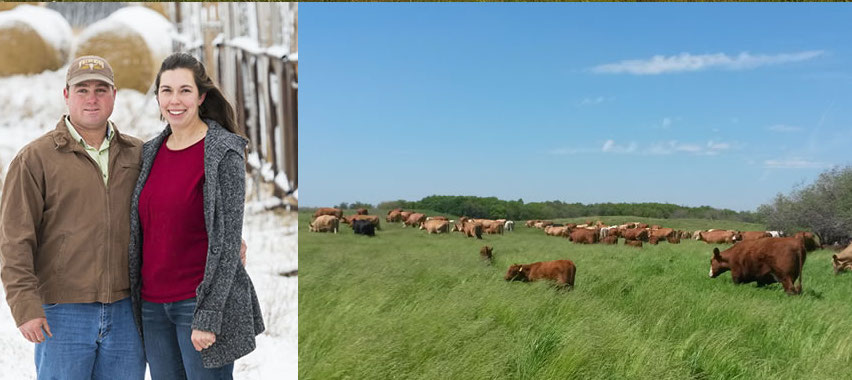Hodgins Farm, MBP 2019 Environmental Stewardship Award recipient

Openness and honesty – these are the hallmarks by which Hodgins Farm operates. And this third-generation farm has found success in bridging the gap between the consumer and producer, an important component in today’s climate of uncertainty and misinformation about how food is raised
By Janet Kantors
The CCA is pleased to feature the provincial stewardship award recipients in the running for the 2019 The Environmental Stewardship Award (TESA). The recipient of the CCA’s national award will be announced at the Canadian Beef Industry Conference in August. As always, a common theme among recipients is a profound sense of obligation to care for land and animals. Through sharing their stories, insights, beliefs and values, readers can gain perspective about the relationship between stewardship and cattle production and the benefits of conservation to society. In this issue, we feature Manitoba Beef Producers 2019 Environmental Stewardship Award recipient, Hodgins Farm, owned and operated by Cameron and Lisa Hodgins.
Cameron and Lisa, a young couple from the Arrow Hills near Lenore, Man., are actively engaged not only in raising the fourth generation to be good stewards of the land, but also by sharing their outcomes. They are well-equipped, as they learned first-hand the value of environmental sustainability from Cameron’s parents, Ed and Debra Hodgins.
“We have learned a lot from our parents and grandparents and hope to pass that information along to our children,” said Cameron Hodgins. “We are trying to honour our past generations and prepare our future generations.”
“We believe ruminants have been a very important part of the prairie ecosystem for thousands of years, and beef cows today are filling the void left from the loss of the bison”
The couple continues to make great progress to that end. Hodgins Farm utilizes a planned grazing system with varying stock densities to balance animal nutrition and pasture growth. Off-site solar watering systems are used, allowing the cattle to have access to better quality water while protecting riparian areas. The family also manage the farm without the use of any pesticides or chemical fertilizers.
Bale grazing adds nutrients back into the soil, and the use of multispecies cover crops extends the grazing season while providing a high level of nutrition to the cattle. The cover crops also provide feed for pollinators, both native and the farm’s own honey bees. When cutting hay, Hodgins leaves conservation strips in select fields to allow pollinators to harvest nectar and pollen, while also letting some of the plants set seed and catch snow in the winter.
“We believe ruminants have been a very important part of the prairie ecosystem for thousands
of years, and beef cows today are filling the void left from the loss of the bison,” said Hodgins. “When our herds are managed correctly, they benefit the landscape, and the mammals, birds and insects in the environment.“There’s more going on in that ecosystem or environment than we can understand or fathom or deal with. If we just let it take its natural cycle, it corrects itself or at least balances out. We don’t need to interfere with everything, but it sure is nice to help things when we can. We want to make sure we’re improving the natural ecosystem that we’re in through regenerative agriculture.”
Environmental stewardship includes farming within the natural ecosystem, which includes re-introducing flora such as trees and shrubs and leaving wetlands intact, which works hand-in-hand with their beef operation. And this is something they want to see continue with the next generation.
“This farm’s been in our family for a couple of generations now, so we just want to ensure that legacy continues on with our family or somebody else’s family,” said Hodgins. “And it’s pretty neat to see the interactions between the livestock and the natural system as you’re growing up. We’re hoping to make sure our kids can still have that learning experience, and their kids can have the same.”
Sharing their stewardship practices with others is key. “The beef cow is filling the role of the bison, which is a pretty important part in the natural ecosystem and evolution of the Canadian prairies. If we manage that grassland correctly, I think it becomes a natural system. Beef cows are one of the last ag commodities that we can produce a product and still function within the natural ecosystem and make it beneficial. With a little bit of education, we can even make it better,” stressed Hodgins.
To help communicate and illustrate their point, Hodgins Farm participates in Manitoba Open Farm Day, hosts kid’s camps and pasture tours, and utilizes social media to promote environmental sustainability and farm life.
“Some of the biggest success that we have found is the comments from consumers coming out to the farm during these events and telling us how nice it is to see animals out on the pastures,” said Hodgins. “It’s also very rewarding as producers to engage is personal conversation with the consumers regarding farm life and our management practices.”
The learning never stops for cattle producers, and Hodgins and his wife Lisa continue to push the envelope to ensure their children, and their children’s children, learn how to make decisions based on information available.
“We need to continue learning as producers and farmers, we can’t just sit status quo, we need to continually push ourselves and learn,” he said. “There’s more than just what’s in front of you sometimes that’s at stake – you need to look beyond this year or next year… you have to look years down the road at what other things you’re impacting.”
Source: Canadian Cattlemen’s Association (CCA)











